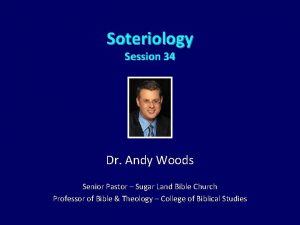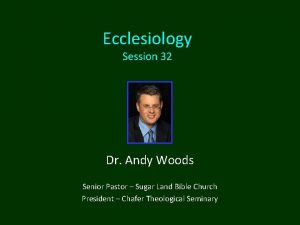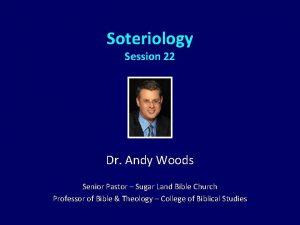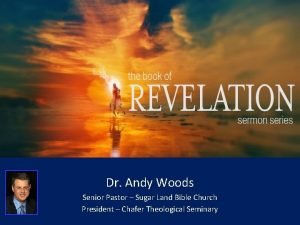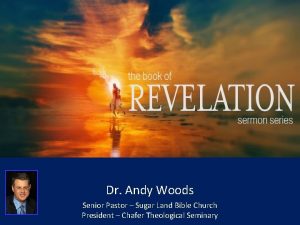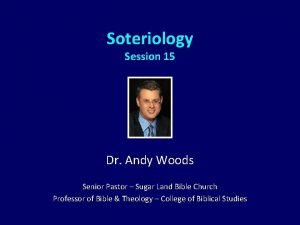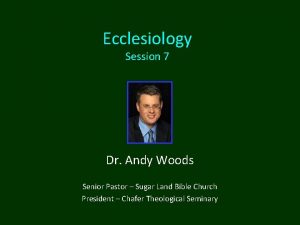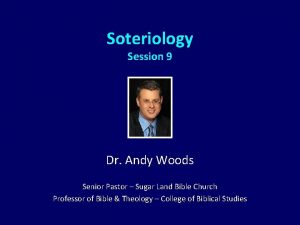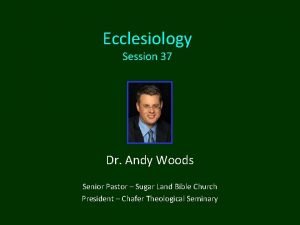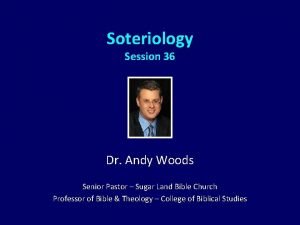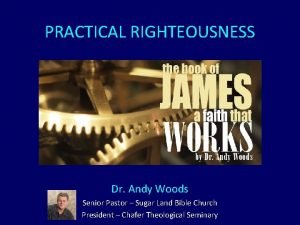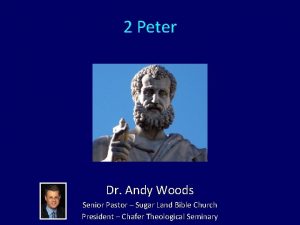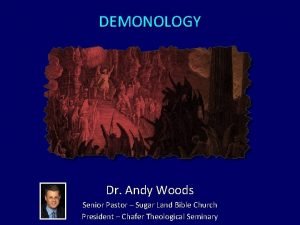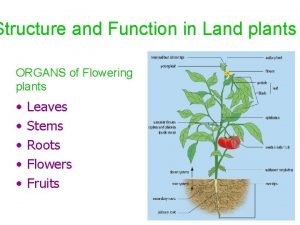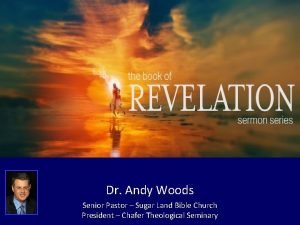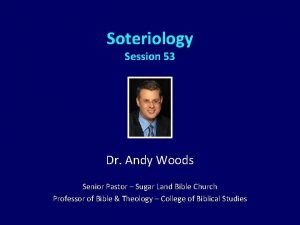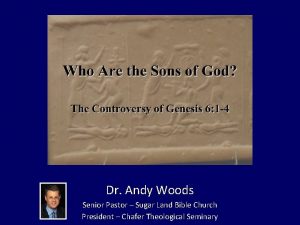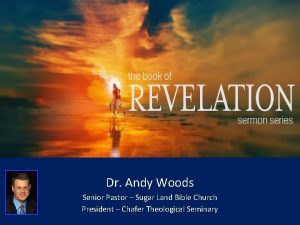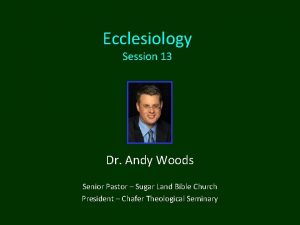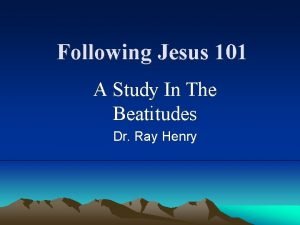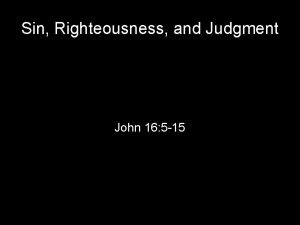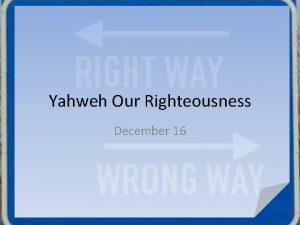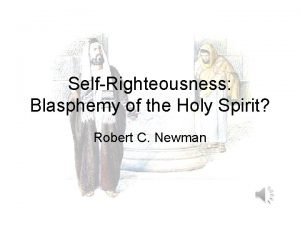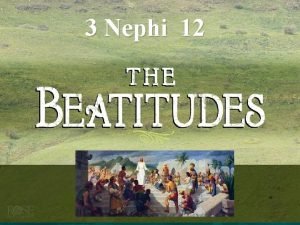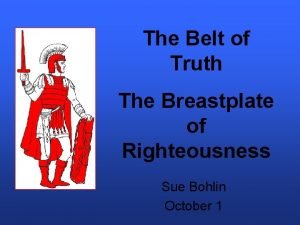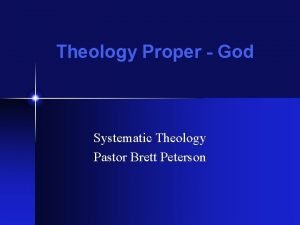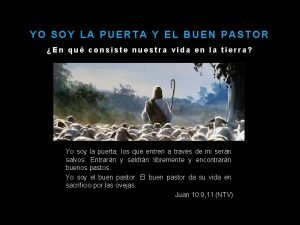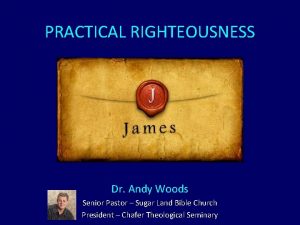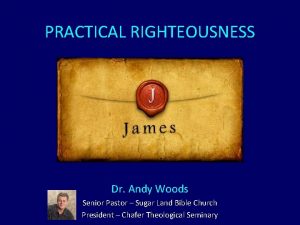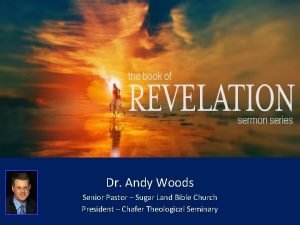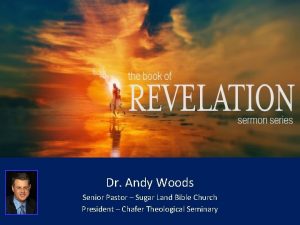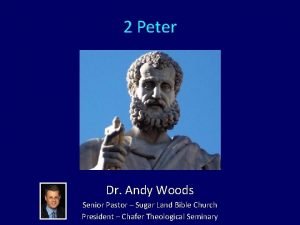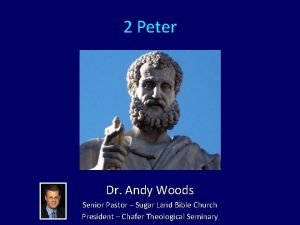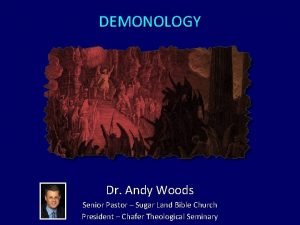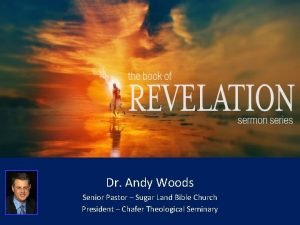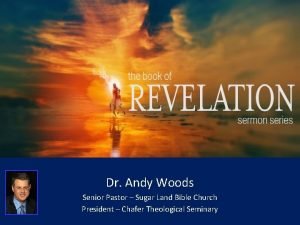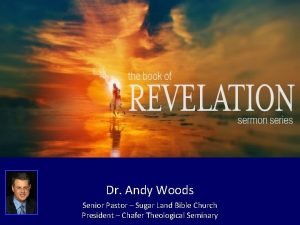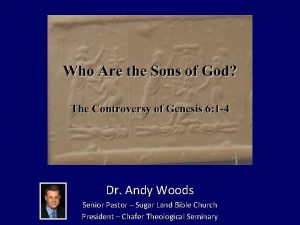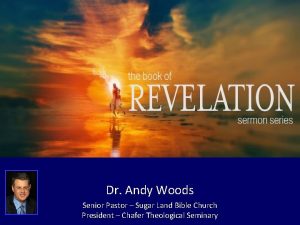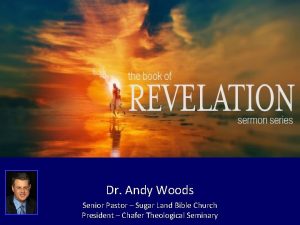PRACTICAL RIGHTEOUSNESS Dr Andy Woods Senior Pastor Sugar




























































- Slides: 60

PRACTICAL RIGHTEOUSNESS Dr. Andy Woods Senior Pastor – Sugar Land Bible Church President – Chafer Theological Seminary

Answering Eleven Questions 1) Who wrote it? – James 2) What do we know about the author? – Christ’s ½ Brother 3) Who was the audience? – Believing Jews in the Diaspora 4) Where was if written from? – Jerusalem 5) When was the book written? – A. D. 44‒ 47 6) What was the book’s occasion? – Practical righteousness 7) What is the book’s purpose? – Achieving practical righteousness 8) What is the book about? – Practical righteousness 9) What is the book’s theme? – Daily living 10) What makes the book different? – Practicality 11) How is the book organized? – Faith and Wisdom

JAMES STRUCTURE I. Faith (James 1: 1‒ 3: 12) II. Wisdom (James 3: 13‒ 5: 20)

JAMES STRUCTURE I. Faith (James 1: 1‒ 3: 12) II. Wisdom (James 3: 13‒ 5: 20)

JAMES STRUCTURE n Faith (1: 1– 3: 12) u Trials (1: 2 -18) u Obedience to the Word (1: 19 -27) u Favoritism (2: 1 -13) u Faith manifesting works (2: 14 -26) u Tongue (3: 1 -12)

JAMES STRUCTURE n Faith (1: 1– 3: 12) u Trials (1: 2 -18) u Obedience to the Word (1: 19 -27) u Favoritism (2: 1 -13) u Faith manifesting works (2: 14 -26) u Tongue (3: 1 -12)

James 1: 2 -18 n Trials – Jas 1: 2 -18 u u Rejoicing during trials – Jas 1: 2 -12 Command not to charge God with temptation – Jas 1: 13 -18

JAMES STRUCTURE n Faith (1: 1– 3: 12) u Trials (1: 2 -18) u Obedience to the Word (1: 19 -27) u Favoritism (2: 1 -13) u Faith manifesting works (2: 14 -26) u Tongue (3: 1 -12)

Faith Obeys God (James 1: 19 -27) I. Need for Slowness in Speaking & Anger (1: 1920) II. Need for Obedience to God’s Word (1: 21 -25) III. Need for True Religion (1: 26 -27)

JAMES STRUCTURE n Faith (1: 1– 3: 12) u Trials (1: 2 -18) u Obedience to the Word (1: 19 -27) u Favoritism (2: 1 -13) u Faith manifesting works (2: 14 -26) u Tongue (3: 1 -12)

Favoritism (2: 1 -13) I. Command: no favoritism (2: 1) II. Situation: favoritism in the assembly (2: 2 -3) III. Reasoning: favoritism is contrary to God’s character & purposes (2: 4 -13)

Favoritism (2: 1 -13) I. Command: no favoritism (2: 1) II. Situation: favoritism in the assembly (2: 2 -3) III. Reasoning: favoritism is contrary to God’s character & purposes (2: 4 -13)

III. Reasoning: Favoritism is Contrary to God’s Character & Purposes (2: 4 -13) A. We judge where God has not (4) B. God elects all (2: 5) C. Rich oppressors (2: 6 -7) D. Favoritism violates God’s Law (2: 8 -11) E. God will judge those showing favoritism (2: 12 -13)

III. Reasoning: Favoritism is Contrary to God’s Character & Purposes (2: 4 -13) A. We judge where God has not (4) B. God elects all (2: 5) C. Rich oppressors (2: 6 -7) D. Favoritism violates God’s Law (2: 8 -11) E. God will judge those showing favoritism (2: 12 -13)

Galatians 3: 28 “There is neither Jew nor Greek, there is neither slave nor free man, there is neither male nor female; for you are all one in Christ Jesus. ”

III. Reasoning: Favoritism is Contrary to God’s Character & Purposes (2: 4 -13) A. We judge where God has not (4) B. God elects all (2: 5) C. Rich oppressors (2: 6 -7) D. Favoritism violates God’s Law (2: 8 -11) E. God will judge those showing favoritism (2: 12 -13)

III. Reasoning: Favoritism is Contrary to God’s Character & Purposes (2: 4 -13) A. We judge where God has not (4) B. God elects all (2: 5) C. Rich oppressors (2: 6 -7) D. Favoritism violates God’s Law (2: 8 -11) E. God will judge those showing favoritism (2: 12 -13)

C. Rich God Haters (Jas 2: 6 -7) 1. Oppressors (6) 2. Blasphemers (7)

III. Reasoning: Favoritism is Contrary to God’s Character & Purposes (2: 4 -13) A. We judge where God has not (4) B. God elects all (2: 5) C. Rich oppressors (2: 6 -7) D. Favoritism violates God’s Law (2: 8 -11) E. God will judge those showing favoritism (2: 12 -13)


Psalm 147: 19 -20 “He declares His words to Jacob, His statutes and His ordinances to Israel. He has not dealt thus with any nation; And as for His ordinances, they have not known them. Praise the LORD!”

SIMILARITIES WITH ACTS 15 James Acts 15 Greetings 1: 1 15: 23 Visit 1: 27 15: 14 Listen 2: 5 15: 13 Turn 5: 19 -20 15: 19 2: 7 15: 17 Being called by God’s name

Date (AD 44 -47) n AD 70 n AD 62 -63 n AD 49 n AD 48 -49 n Sermon on the Mount n Primitive congregational worship (Jas 2: 2; 3: 1; 5: 14) n Jas 1: 1 = Acts 8: 1 -4; 11: 19

Order of Paul’s Letters 1. Galatians (A. D. 49) 2. 1‒ 2 Thessalonians (A. D. 51) 3. 1‒ 2 Corinthians (A. D. 56) 4. Romans (A. D. 57) 5. Ephesians, Colossians, Philemon, Philippians (A. D. 60‒ 62) 6. 1 Timothy, Titus (A. D. 62‒ 66) 7. 2 Timothy (A. D. 67)

2 Timothy 3: 16 -17 “All Scripture is inspired by God and profitable for teaching, for reproof, for correction, for training in righteousness; 17 so that the man of God may be adequate, equipped for every good work. ”

Romans 15: 3 -4 “For even Christ did not please Himself, but as it is written: “The taunts of those who taunt You have fallen on Me. ” For whatever was written in earlier times was written for our instruction, so that through perseverance and the encouragement of the Scriptures we might have hope. ”

Thomas Constable “Notes on James, ” 48, accessed December 1, 2020, http: //www. soniclight. com. “Christians live under a new set of rules, the law of liberty. Israelites lived under a different set of rules, the Law of Moses. The fact that the ‘golden rule’ was part of both the Mosaic Law and the law of Christ, does not mean that we are still under the Mosaic Law. ”

III. Reasoning: Favoritism is Contrary to God’s Character & Purposes (2: 4 -13) A. We judge where God has not (4) B. God elects all (2: 5) C. Rich oppressors (2: 6 -7) D. Favoritism violates God’s Law (2: 8 -11) E. God will judge those showing favoritism (2: 12 -13)


Scripture’s Four Judgments Name Sheep and Goat Judgment of the Jews Bema Seat Great White Throne Scripture Matt 25: 31 -46 Ezek 20: 33 -44 1 Cor 3: 10 -15 Rev 20: 11 -15 Place Earth, Jerusalem Earth, wilderness Heaven Earth Audience Gentile Tribulation survivors Jewish Tribulation survivors Church Age believers All unsaved When After Tribulation After rapture After Millennium Purpose Saved Gentiles Saved Jews enter kingdom Reward believers Degree of punishment in hell Evaluation Treatment of Christ’s brethren Passing under Works taken shepherd’s rod through fire Not in the book; judged by books

John 19: 30 “Therefore when Jesus had received the sour wine, He said, ‘It is finished!’ And He bowed His head and gave up His spirit. ”

John 5: 24 “Truly, truly, I say to you, he who hears My word, and believes Him who sent Me, has eternal life, and does not come into judgment, but has passed out of death into life. ”

Why? n Not to judge sin (John 19: 30) n Not to determine salvation (John 5: 24) n But rather to give or not give rewards

Scripture’s Five Crowns (Rev 4: 10: 3: 11; 2 John 8) Scripture 1 Cor. 9: 24 -27 1 Thess. 2: 19 -20 Jas. 1: 12; Rev. 2: 10 1 Pet. 5: 2 -4 2 Tim. 4: 8 Crown Purpose Incorruptible Gaining mastery over the flesh Rejoicing Life Soul winning Enduring trials Shepherding God’s Glory people Longing for His Righteousness appearing


Donald. W. Burdick “Since he is speaking to believers, the judgment to which he refers must be the judgment of believers at the judgment seat of Christ (2 Cor. 5: 10). ” Hebrews-Revelation. Vol. 12 of The Expositor's Bible Commentary. 12 vols. Edited by Frank E. Gaebelein and J. D. Douglas. Grand Rapids: Zondervan Publishing House, 1981, p.

2 Corinthians 5: 10 “For we must all appear before the judgment seat of Christ, so that each one may be recompensed for his deeds in the body, according to what he has done, whether good or bad. ”

Romans 14: 10, 12 “ 10…For we will all stand before the judgment seat of God… 12 So then each one of us will give an account of himself to God. ”

1 Corinthians 3: 10 -15 “ 10 According to the grace of God which was given to me, like a wise master builder I laid a foundation, and another is building on it. But each man must be careful how he builds on it. 11 For no man can lay a foundation other than the one which is laid, which is Jesus Christ. 12 Now if any man builds on the foundation with gold, silver, precious stones, wood, hay, straw…”

1 Corinthians 3: 14 -15 “ 14 If any man’s work which he has built on it remains, he will receive a reward. 15 If any man’s work is burned up, he will suffer loss; but he himself will be saved, yet so as through fire. ”

1 Corinthians 9: 24 -27 “ 24 Do you not know that those who run in a race all run, but only one receives the prize? Run in such a way that you may win. 25 Everyone who competes in the games exercises self-control in all things. They then do it to receive a perishable wreath, but we an imperishable. 26 Therefore I run in such a way, as not without aim; I box in such a way, as not beating the air; 27 but I discipline my body and make it my slave, so that, after I have preached to others, I myself will not be disqualified. ”

1 John 2: 28 “ 28 Now, little children, abide in Him, so that when He appears, we may have confidence and not shrink away from Him in shame at His coming. If any man’s work which he has built on it remains, he will receive a reward. ”

1 Corinthians 4: 5 “Therefore do not go on passing judgment before the time, but wait until the Lord comes who will both bring to light the things hidden in the darkness and disclose the motives of men’s hearts; and then each man’s praise will come to him from God. ”

Samuel Hoyt “The Judgment Seat of Christ in Theological Perspective, ” Part 2, Bibliotheca Sacra, electronic media. “The judgment seat of Christ might be compared to a commencement ceremony. At graduation there is some measure of disappointment and remorse that one did not do better and work harder. However, at such an event the overwhelming emotion is joy, not remorse. The graduates do not leave the auditorium weeping because they did not earn better grades. Rather, they are thankful that they have been graduated, and they are grateful for what they did achieve. To overdo the sorrow aspect of the judgment seat of Christ is to make heaven hell. To under do the sorrow aspect is to make faithfulness inconsequential” (underlining mine).

Areas of Systematic Theology 1. Prolegomena – Introduction 2. Bibliology – Study of the Bible 3. Theology – Study of God 4. Christology – Study of Christ 5. Pneumatology – Study of the Holy Spirit 6. Anthropology – Study of Man 7. Hamartiology – Study of sin 8. Soteriology – Study of salvation 9. Angelology – Study of angels 10. Ecclesiology – Study of the Church 11. Eschatology – Study of the end

Areas of Systematic Theology 1. Prolegomena – Introduction 2. Bibliology – Study of the Bible 3. Theology – Study of God 4. Christology – Study of Christ 5. Pneumatology – Study of the Holy Spirit 6. Anthropology – Study of Man 7. Hamartiology – Study of sin 8. Soteriology – Study of salvation 9. Angelology – Study of angels 10. Ecclesiology – Study of the Church 11. Eschatology – Study of the end

CONCLUSION

JAMES STRUCTURE n Faith (1: 1– 3: 12) u Trials (1: 2 -18) u Obedience to the Word (1: 19 -27) u Favoritism (2: 1 -13) u Faith manifesting works (2: 14 -26) u Tongue (3: 1 -12)

Favoritism (2: 1 -13) I. Command: no favoritism (2: 1) II. Situation: favoritism in the assembly (2: 2 -3) III. Reasoning: favoritism is contrary to God’s character & purposes (2: 4 -13)

III. Reasoning: Favoritism is Contrary to God’s Character & Purposes (2: 4 -13) A. We judge where God has not (4) B. God elects all (2: 5) C. Rich oppressors (2: 6 -7) D. Favoritism violates God’s Law (2: 8 -11) E. God will judge those showing favoritism (2: 12 -13)

JAMES STRUCTURE n Faith (1: 1– 3: 12) u Trials (1: 2 -18) u Obedience to the Word (1: 19 -27) u Favoritism (2: 1 -13) u Faith manifesting works (2: 14 -26) u Tongue (3: 1 -12)

Faith Manifesting Works (2: 14 -26) n Thesis: works accompany useful faith (2: 14) n Five illustrations (2: 15 -26) u Needy brother (2: 15 -17) u Demonic monotheist (2: 18 -19) u Abraham (2: 20 -24) u Rahab (2: 25) u Lifeless corpse (2: 26)

Three Tenses of Salvation Phase Justification Sanctification Glorification Tense Past Present Future Saved from sin’s: Penalty Power Presence Scripture Eph 2: 8 -9; Titus 3: 5 Philip 2: 12 Rom 5: 10 Nature Single Dual Single

Three Tenses of Salvation Phase Justification Sanctification Glorification Tense Past Present Future Saved from sin’s: Penalty Power Presence Scripture Eph 2: 8 -9; Titus 3: 5 Philip 2: 12 Rom 5: 10 Nature Single Dual Single

Harmony Between Paul and James PAUL JAMES Phase of Salvation Justification Sanctification Tense of Salvation First tense Second tense Self righteous Judaism Dead orthodoxy Gen 15: 6 Gen 22 Issue Genesis

Harmony Between Paul and James PAUL JAMES Evidence of the Declaration of Justification usefulness believer's innocence before God faith before man Save Justification Sanctification Faith Saving faith Serving faith Favor with God Believer's moral deeds Works

Lewis Sperry Chafer Systematic Theology (Grand Rapids, MI: Kregel Publications, 1993), vol. 7, 148. “In its larger usage, the word faith represents at least four varied ideas: (1) As above, it can be personal confidence in God. This the most common aspect of faith may be subdivided into three features: (a) Saving faith, which is the inwrought confidence in God’s promises and provisions respecting the Savior that leads one to elect to repose upon and trust in the One who alone can save. (b) Serving faith, which contemplates as true the fact of divinely bestowed gifts and all details respecting divine appointments for service. This faith is always a personal matter, and so one believer should not become a pattern for another. That such faith with its personal characteristic may be kept inviolate, …

Lewis Sperry Chafer Systematic Theology (Grand Rapids, MI: Kregel Publications, 1993), vol. 7, 148. “…the Apostle writes: “Hast thou faith? have it to thyself before God” (Rom. 14: 22). Great injury may be wrought if one Christian imitates another in matters of appointment for service. (c) Sanctifying or sustaining faith, which lays hold of the power of God for one’s daily life. It is the life lived in dependence upon God, working upon a new life-principle (Rom. 6: 4). The justified one, having become what he is by faith, must go ahead living on the same principle of utter dependence upon God. ”

Romans 12: 3 -8 “ 3 For through the grace given to me I say to everyone among you not to think more highly of himself than he ought to think; but to think so as to have sound judgment, as God has allotted to each a measure of faith. 4 For just as we have many members in one body and all the members do not have the same function, 5 so we, who are many, are one body in Christ, and individually members one of another. ”

Romans 12: 3 -8 “ 6 Since we have gifts that differ according to the grace given to us, each of us is to exercise them accordingly: if prophecy, according to the proportion of his faith; 7 if service, in his serving; or he who teaches, in his teaching; 8 or he who exhorts, in his exhortation; he who gives, with liberality; he who leads, with diligence; he who shows mercy, with cheerfulness. ”
 Sugarland bible church andy woods
Sugarland bible church andy woods Pastor andy woods wife
Pastor andy woods wife Pastor andy woods
Pastor andy woods Andy woods church
Andy woods church Sugarland bible church
Sugarland bible church Pastor andy woods wife
Pastor andy woods wife Andy woods pastor age
Andy woods pastor age 2 timothy 2:15 nasb
2 timothy 2:15 nasb Dr andy woods
Dr andy woods Dr andy woods
Dr andy woods Andy woods pastor
Andy woods pastor Practical righteousness
Practical righteousness Andy wood pastor bio
Andy wood pastor bio Andy wood pastor abuse
Andy wood pastor abuse Andy woods sermons
Andy woods sermons Reducing and non reducing sugar
Reducing and non reducing sugar Tracheids and vessels
Tracheids and vessels Reducing vs. non-reducing sugars
Reducing vs. non-reducing sugars Cookery lab
Cookery lab Sugar sink in plants
Sugar sink in plants Dr andy woods sugarland bible church
Dr andy woods sugarland bible church Andy woods soteriology
Andy woods soteriology Andy woods angelology
Andy woods angelology Andy woods genesis
Andy woods genesis Andy woods daniel
Andy woods daniel Andy woods the coming kingdom
Andy woods the coming kingdom Sugarland bible church
Sugarland bible church The coming kingdom andy woods
The coming kingdom andy woods Major prophets
Major prophets Andy woods zechariah
Andy woods zechariah Andy woods daniel
Andy woods daniel Andy woods angelology
Andy woods angelology Andy woods ezekiel
Andy woods ezekiel Andy woods the coming kingdom
Andy woods the coming kingdom Andy woods daniel
Andy woods daniel Andy woods daniel
Andy woods daniel Mai gin
Mai gin So teach my song to rise to you
So teach my song to rise to you Imparted righteousness
Imparted righteousness John 16:8
John 16:8 Divine righteousness
Divine righteousness What does it mean to hunger and thirst for righteousness
What does it mean to hunger and thirst for righteousness Judge with righteous judgement
Judge with righteous judgement Yahweh our righteousness
Yahweh our righteousness Spirit of self righteousness
Spirit of self righteousness Slaves to righteousness
Slaves to righteousness Dharma righteousness
Dharma righteousness What are the 12 beatitudes
What are the 12 beatitudes Weapons of righteousness
Weapons of righteousness What are the qualities of a pure heart
What are the qualities of a pure heart Hunger and thirst after righteousness
Hunger and thirst after righteousness Seek first the kingdom of god esv
Seek first the kingdom of god esv Belt of truth means
Belt of truth means For instruction in righteousness
For instruction in righteousness Canto sou bom pastor ovelhas guardarei
Canto sou bom pastor ovelhas guardarei Palabras derivadas de pastor
Palabras derivadas de pastor Pastor brett peterson
Pastor brett peterson Alabanza salmo 23
Alabanza salmo 23 Pastor otavio rendeiro filho
Pastor otavio rendeiro filho Jn 10 11 salmo 23 yo soy
Jn 10 11 salmo 23 yo soy Jn 10:9
Jn 10:9
